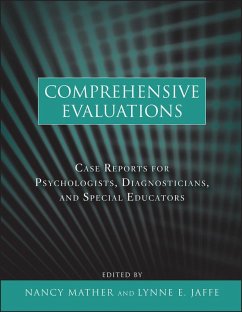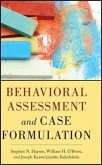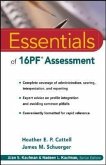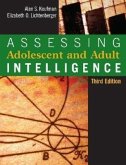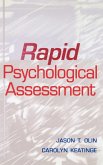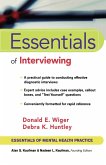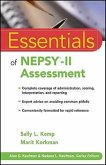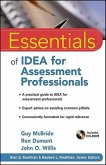Nancy Mather, Lynne E Jaffe
Comprehensive Evaluations
Case Reports for Psychologists, Diagnosticians, and Special Educators
Nancy Mather, Lynne E Jaffe
Comprehensive Evaluations
Case Reports for Psychologists, Diagnosticians, and Special Educators
- Broschiertes Buch
- Merkliste
- Auf die Merkliste
- Bewerten Bewerten
- Teilen
- Produkt teilen
- Produkterinnerung
- Produkterinnerung
An invaluable collection of sample case reports from experts in child and adolescent assessment With contributions from authorities in the fields of psychology and special education-including Dawn Flanagan, Elaine Fletcher-Janzen, Randy Kamphaus, Nadeen Kaufman, George McCloskey, Jack Naglieri, Cecil Reynolds, and Gale Roid-Comprehensive Evaluations provides over fifty sample case reports to help you draft carefully planned, goal-directed, and comprehensive evaluations that clearly explain the reasons for a student's school-related difficulties, from preschool to postsecondary level. A…mehr
Andere Kunden interessierten sich auch für
![Behavioral Assessment and Case Formulation Behavioral Assessment and Case Formulation]() Stephen N HaynesBehavioral Assessment and Case Formulation113,99 €
Stephen N HaynesBehavioral Assessment and Case Formulation113,99 €![Essentials of 16PF Assessment Essentials of 16PF Assessment]() Heather E P CattellEssentials of 16PF Assessment52,99 €
Heather E P CattellEssentials of 16PF Assessment52,99 €![Assessing Adolescent and Adult Intelligence Assessing Adolescent and Adult Intelligence]() Alan S KaufmanAssessing Adolescent and Adult Intelligence230,99 €
Alan S KaufmanAssessing Adolescent and Adult Intelligence230,99 €![Rapid Psychological Assessment Rapid Psychological Assessment]() Jason T OlinRapid Psychological Assessment137,99 €
Jason T OlinRapid Psychological Assessment137,99 €![Essentials of Interviewing Essentials of Interviewing]() Donald E WigerEssentials of Interviewing52,99 €
Donald E WigerEssentials of Interviewing52,99 €![Essentials of NEPSY-II Assessment Essentials of NEPSY-II Assessment]() Sally L KempEssentials of NEPSY-II Assessment54,99 €
Sally L KempEssentials of NEPSY-II Assessment54,99 €![Essentials of Idea for Assessment Professionals Essentials of Idea for Assessment Professionals]() Guy McbrideEssentials of Idea for Assessment Professionals58,99 €
Guy McbrideEssentials of Idea for Assessment Professionals58,99 €-
-
-
An invaluable collection of sample case reports from experts in child and adolescent assessment With contributions from authorities in the fields of psychology and special education-including Dawn Flanagan, Elaine Fletcher-Janzen, Randy Kamphaus, Nadeen Kaufman, George McCloskey, Jack Naglieri, Cecil Reynolds, and Gale Roid-Comprehensive Evaluations provides over fifty sample case reports to help you draft carefully planned, goal-directed, and comprehensive evaluations that clearly explain the reasons for a student's school-related difficulties, from preschool to postsecondary level. A wellspring of information for educational professionals, Comprehensive Evaluations provides models for writing diagnostic reports to accompany the tests most frequently administered in the evaluation of children, adolescents, and adults, including the BASC-2, KABC-II, WAIS-IV, WISC-IV, and WJ III. The reports reflect various disciplines within psychology and education, different theoretical perspectives and paradigms, and span a broad spectrum of disabilities. The diagnostic reports found within Comprehensive Evaluations will help: * Expand your familiarity with widely used test instruments * Enhance your understanding of the interpretation of test scores * Improve your ability to tailor written reports to the purposes of the evaluation * Translate assessment results into meaningful treatment recommendations * Recognize the differences in what evaluators from various school districts, agencies, and private practices consider to be a comprehensive evaluation * Appreciate how your theoretical perspective and choice of tests can influence diagnostic conclusions * Determine a report writing style that meets your needs Comprehensive Evaluations deftly illustrates how thorough assessments help empirically pinpoint the reasons a student is struggling in school, which then allows an evaluator to select the most appropriate accommodations and interventions to help the student succeed.
Hinweis: Dieser Artikel kann nur an eine deutsche Lieferadresse ausgeliefert werden.
Hinweis: Dieser Artikel kann nur an eine deutsche Lieferadresse ausgeliefert werden.
Produktdetails
- Produktdetails
- Verlag: Wiley
- Seitenzahl: 672
- Erscheinungstermin: 7. Dezember 2010
- Englisch
- Abmessung: 280mm x 215mm x 34mm
- Gewicht: 1542g
- ISBN-13: 9780470617915
- ISBN-10: 0470617918
- Artikelnr.: 31194875
- Herstellerkennzeichnung
- Libri GmbH
- Europaallee 1
- 36244 Bad Hersfeld
- gpsr@libri.de
- Verlag: Wiley
- Seitenzahl: 672
- Erscheinungstermin: 7. Dezember 2010
- Englisch
- Abmessung: 280mm x 215mm x 34mm
- Gewicht: 1542g
- ISBN-13: 9780470617915
- ISBN-10: 0470617918
- Artikelnr.: 31194875
- Herstellerkennzeichnung
- Libri GmbH
- Europaallee 1
- 36244 Bad Hersfeld
- gpsr@libri.de
Nancy Mather, PhD, is a Professor of Learning Disabilities at the University of Arizona. A coauthor on the Woodcock-Johnson III, she specializes in the areas of assessment, reading, and writing. She has served as a learning disabilities teacher, diagnostician, university professor, and educational consultant. Lynne E. Jaffe, PhD, is an Adjunct Assistant Professor of Learning Disabilities at the University of Arizona. She maintains a private practice in evaluation, consultation, and educational therapy for students with learning disabilities. She is coauthor with Nancy Mather of Woodcock-Johnson III: Reports, Recommendations, and Strategies (published by Wiley).
Acknowledgments.
List of Contributors.
Foreword (John O. Willis, Ed.D.).
Introduction.
1 Assessment of Individuals with Autism: Procedures and Pitfalls (Sally
Logerquist, Ph.D.).
2 Neuropsychological Evaluation of a Young Child with a Seizure Disorder (
Marshall Andrew Glenn, Ph.D.).
3 Language Assessment of a Sibling of a Child with Autism (Dale A. Bailey,
M.A., CCC-SLP).
4 Cognitive and Achievement Correlates of Language Disorders (Stephen
Camarata, Ph.D., CCC-SLP, and Mary N. Camarata, M.S., CCC-SLP).
5 Comorbidity and Cumulative Effects of Inattention, Poor Emotional
Control, and Language Problems on Academic Achievement in Early Childhood (
R. W. Kamphaus, Ph.D., and Tara C. Raines, Psy.S.).
6 How a Weakness in Attention Can Mask True Learning Capabilities and
Achievement Gains (Eva M. Prince, Ed.S).
7 Associative Memory Disorder: An Unexpected Struggle Resulting in
Difficulty with Basic Skill Acquisition (James M. Creed, M.Ed.).
8 Evaluation of a Bilingual Student with a History of Language Delay:
Differentiating Between a Language Impairment and Second Language Learning
(Brigid Garvin, M.Ed.).
9 Twice-Exceptional: A Gifted Child with Concomitant Learning Disabilities
(Aimee Yermish, Psy.D.).
10 An Elementary School Student with a Specific Learning Disability in
Reading: Use of the DAS-II to Generate and Test Causal Hypotheses (Colin D.
Elliott, Ph.D.).
11 Using a Pattern of Strengths and Weaknesses Approach in a Complex Case (
James Hanson, M.Ed.).
12 Learning Is the Best Therapy: The Emotional Consequences of a Learning
Disability (Lynne E. Jaffe, Ph.D.).
13 Difference versus Disorder: Nondiscriminatory Assessment of an English
Learner Suspected of Learning Disability (Samuel O. Ortiz, Ph.D.).
14 Using the PASS Theory to Uncover Disorders in Basic Psychological
Processes: An Example of Specific Learning Disability (Jack A. Naglieri,
Ph.D.).
15 Neuropsychological Evaluation of a Child with a Brain Injury at Birth (
Sam Goldstein, Ph.D., and Sean Cunningham, M.S.).
16 Missing Out on Early Intervention: The Delay of Appropriate Services for
a Child with SLD (Nancy Mather, Ph.D.).
17 Learning Disabilities and Mathematics: A School Psychological Framework
(Steven G. Feifer, D.Ed.).
18 The Cognitive Assessment System and the Wechsler Intelligence Scale for
Children-IV in a Neuropsychological Context (Tulio M. Otero, Ph.D., and
Jack A. Naglieri, Ph.D.).
19 Reestablishing Eligibility and Reevaluation Post Natural Disaster (Tara
C. Raines, Psy.S., and Cecil Reynolds, Ph.D.).
20 Psychoeducational Assessment of a Child with High-Functioning Autism
Using a Problem-Solving Approach (Joel S. Hanania, Ph.D.).
21 RTI Data and Cognitive Assessment Are Both Useful for SLD Identification
and Intervention Planning (Dawn Flanagan, Ph.D., and Vincent Alfonso, Ph.D.
).
22 Specific Learning Disability Report: The Importance of Professional
Judgment (Edward Schultz, Ph.D.).
23 Integrating RTI with an Individual Comprehensive Assessment to Identify
a Specific Learning Disability in Reading (Donna Rury Smith, Ed.D.).
24 Assessing a Child with a Nonspecific Pervasive Development Disorder: Can
a Nonverbal Cognitive Measure Help? (R. Steve McCallum, Ph.D.).
25 Difficulty Versus Disability? A Student Struggling with Math (John M.
Garruto, D.Ed.).
26 Psychoeducational Assessment of a Student with a Visual Impairment Using
the Woodcock-Johnson III Tests of Achievement-Braille Adaptation (Kimberly
Morris, Ph.D.).
27 Differential Diagnosis: ADHD, Emotional Disturbance, or Asperger's
Syndrome? (Elaine Fletcher-Janzen, Ed.D.).
28 The Heterogeneity and Complexities of Children with Developmental Delays
(Melissa M. King, M.Ed., and Mary C. Wright, M.A.).
29 Differential Diagnosis: Emotional Disturbance or Conduct Disorder? (
Elaine Fletcher-Janzen, Ed.D.).
30 Integration of Post-Referral Progress Monitoring Data in a Specific
Learning Disability Evaluation (Robert Misak, M.A., M.Ed.).
31 Sweet Child (But Only When Not in School) (Mitchel D. Perlman, Ph.D.).
32 Psychoeducational Evaluation of a Bilingual Student with a Visual
Impairment (Sarah Gaines, Psy.S.).
33 Memory and Processing Assessments: A Report for Parents (Milton J. Dehn,
Ph.D.).
34 Oral and Written Language Influences on Academic and Social Functioning:
A Whole Child Approach (Blanche Podhajski, Ph.D., and Frances Ingram, M.A.
).
35 Process Assessment of the Learner, 2nd Edition (PAL-II): Comprehensive
Assessment for Evidence-Based, Treatment-Relevant Differential Diagnosis of
Dysgraphia, Dyslexia, Oral and Written Language Learning Disability
(OWLLD), and Dyscalculia (Virginia W. Berninger, Ph.D.).
36 Math Problem Solving: Applying a Processing Model to LD Determination (
Gail M. Cheramie, Ph.D., Linda Hernandez Parks, M.A., and Ashley Schuler,
M.A.).
37 "Nonverbal" Learning Disabilities or Asperger's Syndrome? Clarification
Through Cognitive Hypothesis Testing (Lisa A. Hain, Psy.D., and James B.
Hale, Ph.D.).
38 Applying a Multilevel Interpretive Framework with an Emphasis on the
Assessment of Executive Functions (George McCloskey, Ph.D.).
39 The Assessment of "Nonverbal" Learning Disabilities (Christopher J.
Nicholls, Ph.D.).
40 Actively Involving an Adolescent in the Evaluation Process from Intake
to Feedback: Promoting Positive Outcomes (Elizabeth O. Lichtenberger,
Ph.D., and Nadeen L. Kaufman, Ed.D.).
41 A Comprehensive Evaluation of a High School Student: When
Social-Emotional Functioning and Specific Learning Disabilities Interact (
Toby D. Laird, Ph.D.).
42 ADHD: To Be or Not to Be? That Was the Question (Ron Dumont, Ed.D.).
43 Assessing an Adolescent English Language Learner: Teasing Apart the
Threads of Two Languages (Deborah Rhein, Ph.D.).
44 Neuropsychological Evaluation of an Adolescent with Moderate Mental
Retardation: The Importance of Making an Accurate Diagnosis (Janice
Sammons, Ph.D., and Judith M. Kroese, Ph.D., CCC-SLP).
45 The Impact of Slow Processing Speed on Performance (Jane McClure, Ph.D.
).
46 Falling Through the Cracks: An Adolescent with a Severe Reading
Disability (Bashir Abu-Hamour, Ph.D., Annmarie Urso, Ph.D., and Nancy
Mather, Ph.D.).
47 A Multiple Measures Approach to Assessing a Student Who Is Deaf (Lisa S.
Coyner, Ph.D.).
48 Comprehensive Assessment of an Attention-Based Learning Problem:
Capturing the Relevance of "Psychological Vital Signs" (Thomas M. Brunner,
Ph.D.).
49 Psychoeducational Assessment of a Juvenile Offender in a Correctional
Setting (Christina Vasquez, Ed.S., and Richard Morris, Ph.D.).
50 When the Child with Specific Learning Disabilities Grows Up (Nicole
Ofiesh, Ph.D.).
51 A Comprehensive Evaluation of a High-Functioning Secondary Student with
Dyslexia (Chris Coleman, M.A.).
52 Use of Nonverbal Cognitive Assessment to Distinguish Learning
Disabilities from Second Language Learning Difficulties (Sherry Mee Bell,
Ph.D.).
53 The Enduring Nature of Specific Learning Disability: A College Freshman
with a Specific Reading Disability (Barbara J. Wendling, M.A.).
54 Comprehensive Evaluation of a Hard of Hearing High School Student in a
Rural Setting (Kelly Metz, M.Ed.).
55 Assessment of a Cognitively Capable Student Who Is Struggling to Succeed
in College (Andrew Shanock, Ph.D.).
56 Making the Most of One's Strengths: When Verbal Intelligence and
Dedication to Succeed Overcome Late Identification (Michael E. Gerner,
Ph.D.).
57 Use of the Stanford-Binet Fifth Edition in a Brain Injury Case (Gale
Roid, Ph.D., and Krystle Edwards, B.S.).
58 Psychoeducational Evaluation of an Adult for LD and ADHD: Integrating
Neuropsychological Measures into Cross-Battery Assessment (Cathy Fiorello,
Ph.D.).
Appendix A: Table of Reports.
Appendix B: Guidelines for Writing Psychoeducational Assessment Reports.
Appendix C: Test Acronyms.
List of Contributors.
Foreword (John O. Willis, Ed.D.).
Introduction.
1 Assessment of Individuals with Autism: Procedures and Pitfalls (Sally
Logerquist, Ph.D.).
2 Neuropsychological Evaluation of a Young Child with a Seizure Disorder (
Marshall Andrew Glenn, Ph.D.).
3 Language Assessment of a Sibling of a Child with Autism (Dale A. Bailey,
M.A., CCC-SLP).
4 Cognitive and Achievement Correlates of Language Disorders (Stephen
Camarata, Ph.D., CCC-SLP, and Mary N. Camarata, M.S., CCC-SLP).
5 Comorbidity and Cumulative Effects of Inattention, Poor Emotional
Control, and Language Problems on Academic Achievement in Early Childhood (
R. W. Kamphaus, Ph.D., and Tara C. Raines, Psy.S.).
6 How a Weakness in Attention Can Mask True Learning Capabilities and
Achievement Gains (Eva M. Prince, Ed.S).
7 Associative Memory Disorder: An Unexpected Struggle Resulting in
Difficulty with Basic Skill Acquisition (James M. Creed, M.Ed.).
8 Evaluation of a Bilingual Student with a History of Language Delay:
Differentiating Between a Language Impairment and Second Language Learning
(Brigid Garvin, M.Ed.).
9 Twice-Exceptional: A Gifted Child with Concomitant Learning Disabilities
(Aimee Yermish, Psy.D.).
10 An Elementary School Student with a Specific Learning Disability in
Reading: Use of the DAS-II to Generate and Test Causal Hypotheses (Colin D.
Elliott, Ph.D.).
11 Using a Pattern of Strengths and Weaknesses Approach in a Complex Case (
James Hanson, M.Ed.).
12 Learning Is the Best Therapy: The Emotional Consequences of a Learning
Disability (Lynne E. Jaffe, Ph.D.).
13 Difference versus Disorder: Nondiscriminatory Assessment of an English
Learner Suspected of Learning Disability (Samuel O. Ortiz, Ph.D.).
14 Using the PASS Theory to Uncover Disorders in Basic Psychological
Processes: An Example of Specific Learning Disability (Jack A. Naglieri,
Ph.D.).
15 Neuropsychological Evaluation of a Child with a Brain Injury at Birth (
Sam Goldstein, Ph.D., and Sean Cunningham, M.S.).
16 Missing Out on Early Intervention: The Delay of Appropriate Services for
a Child with SLD (Nancy Mather, Ph.D.).
17 Learning Disabilities and Mathematics: A School Psychological Framework
(Steven G. Feifer, D.Ed.).
18 The Cognitive Assessment System and the Wechsler Intelligence Scale for
Children-IV in a Neuropsychological Context (Tulio M. Otero, Ph.D., and
Jack A. Naglieri, Ph.D.).
19 Reestablishing Eligibility and Reevaluation Post Natural Disaster (Tara
C. Raines, Psy.S., and Cecil Reynolds, Ph.D.).
20 Psychoeducational Assessment of a Child with High-Functioning Autism
Using a Problem-Solving Approach (Joel S. Hanania, Ph.D.).
21 RTI Data and Cognitive Assessment Are Both Useful for SLD Identification
and Intervention Planning (Dawn Flanagan, Ph.D., and Vincent Alfonso, Ph.D.
).
22 Specific Learning Disability Report: The Importance of Professional
Judgment (Edward Schultz, Ph.D.).
23 Integrating RTI with an Individual Comprehensive Assessment to Identify
a Specific Learning Disability in Reading (Donna Rury Smith, Ed.D.).
24 Assessing a Child with a Nonspecific Pervasive Development Disorder: Can
a Nonverbal Cognitive Measure Help? (R. Steve McCallum, Ph.D.).
25 Difficulty Versus Disability? A Student Struggling with Math (John M.
Garruto, D.Ed.).
26 Psychoeducational Assessment of a Student with a Visual Impairment Using
the Woodcock-Johnson III Tests of Achievement-Braille Adaptation (Kimberly
Morris, Ph.D.).
27 Differential Diagnosis: ADHD, Emotional Disturbance, or Asperger's
Syndrome? (Elaine Fletcher-Janzen, Ed.D.).
28 The Heterogeneity and Complexities of Children with Developmental Delays
(Melissa M. King, M.Ed., and Mary C. Wright, M.A.).
29 Differential Diagnosis: Emotional Disturbance or Conduct Disorder? (
Elaine Fletcher-Janzen, Ed.D.).
30 Integration of Post-Referral Progress Monitoring Data in a Specific
Learning Disability Evaluation (Robert Misak, M.A., M.Ed.).
31 Sweet Child (But Only When Not in School) (Mitchel D. Perlman, Ph.D.).
32 Psychoeducational Evaluation of a Bilingual Student with a Visual
Impairment (Sarah Gaines, Psy.S.).
33 Memory and Processing Assessments: A Report for Parents (Milton J. Dehn,
Ph.D.).
34 Oral and Written Language Influences on Academic and Social Functioning:
A Whole Child Approach (Blanche Podhajski, Ph.D., and Frances Ingram, M.A.
).
35 Process Assessment of the Learner, 2nd Edition (PAL-II): Comprehensive
Assessment for Evidence-Based, Treatment-Relevant Differential Diagnosis of
Dysgraphia, Dyslexia, Oral and Written Language Learning Disability
(OWLLD), and Dyscalculia (Virginia W. Berninger, Ph.D.).
36 Math Problem Solving: Applying a Processing Model to LD Determination (
Gail M. Cheramie, Ph.D., Linda Hernandez Parks, M.A., and Ashley Schuler,
M.A.).
37 "Nonverbal" Learning Disabilities or Asperger's Syndrome? Clarification
Through Cognitive Hypothesis Testing (Lisa A. Hain, Psy.D., and James B.
Hale, Ph.D.).
38 Applying a Multilevel Interpretive Framework with an Emphasis on the
Assessment of Executive Functions (George McCloskey, Ph.D.).
39 The Assessment of "Nonverbal" Learning Disabilities (Christopher J.
Nicholls, Ph.D.).
40 Actively Involving an Adolescent in the Evaluation Process from Intake
to Feedback: Promoting Positive Outcomes (Elizabeth O. Lichtenberger,
Ph.D., and Nadeen L. Kaufman, Ed.D.).
41 A Comprehensive Evaluation of a High School Student: When
Social-Emotional Functioning and Specific Learning Disabilities Interact (
Toby D. Laird, Ph.D.).
42 ADHD: To Be or Not to Be? That Was the Question (Ron Dumont, Ed.D.).
43 Assessing an Adolescent English Language Learner: Teasing Apart the
Threads of Two Languages (Deborah Rhein, Ph.D.).
44 Neuropsychological Evaluation of an Adolescent with Moderate Mental
Retardation: The Importance of Making an Accurate Diagnosis (Janice
Sammons, Ph.D., and Judith M. Kroese, Ph.D., CCC-SLP).
45 The Impact of Slow Processing Speed on Performance (Jane McClure, Ph.D.
).
46 Falling Through the Cracks: An Adolescent with a Severe Reading
Disability (Bashir Abu-Hamour, Ph.D., Annmarie Urso, Ph.D., and Nancy
Mather, Ph.D.).
47 A Multiple Measures Approach to Assessing a Student Who Is Deaf (Lisa S.
Coyner, Ph.D.).
48 Comprehensive Assessment of an Attention-Based Learning Problem:
Capturing the Relevance of "Psychological Vital Signs" (Thomas M. Brunner,
Ph.D.).
49 Psychoeducational Assessment of a Juvenile Offender in a Correctional
Setting (Christina Vasquez, Ed.S., and Richard Morris, Ph.D.).
50 When the Child with Specific Learning Disabilities Grows Up (Nicole
Ofiesh, Ph.D.).
51 A Comprehensive Evaluation of a High-Functioning Secondary Student with
Dyslexia (Chris Coleman, M.A.).
52 Use of Nonverbal Cognitive Assessment to Distinguish Learning
Disabilities from Second Language Learning Difficulties (Sherry Mee Bell,
Ph.D.).
53 The Enduring Nature of Specific Learning Disability: A College Freshman
with a Specific Reading Disability (Barbara J. Wendling, M.A.).
54 Comprehensive Evaluation of a Hard of Hearing High School Student in a
Rural Setting (Kelly Metz, M.Ed.).
55 Assessment of a Cognitively Capable Student Who Is Struggling to Succeed
in College (Andrew Shanock, Ph.D.).
56 Making the Most of One's Strengths: When Verbal Intelligence and
Dedication to Succeed Overcome Late Identification (Michael E. Gerner,
Ph.D.).
57 Use of the Stanford-Binet Fifth Edition in a Brain Injury Case (Gale
Roid, Ph.D., and Krystle Edwards, B.S.).
58 Psychoeducational Evaluation of an Adult for LD and ADHD: Integrating
Neuropsychological Measures into Cross-Battery Assessment (Cathy Fiorello,
Ph.D.).
Appendix A: Table of Reports.
Appendix B: Guidelines for Writing Psychoeducational Assessment Reports.
Appendix C: Test Acronyms.
Acknowledgments.
List of Contributors.
Foreword (John O. Willis, Ed.D.).
Introduction.
1 Assessment of Individuals with Autism: Procedures and Pitfalls (Sally
Logerquist, Ph.D.).
2 Neuropsychological Evaluation of a Young Child with a Seizure Disorder (
Marshall Andrew Glenn, Ph.D.).
3 Language Assessment of a Sibling of a Child with Autism (Dale A. Bailey,
M.A., CCC-SLP).
4 Cognitive and Achievement Correlates of Language Disorders (Stephen
Camarata, Ph.D., CCC-SLP, and Mary N. Camarata, M.S., CCC-SLP).
5 Comorbidity and Cumulative Effects of Inattention, Poor Emotional
Control, and Language Problems on Academic Achievement in Early Childhood (
R. W. Kamphaus, Ph.D., and Tara C. Raines, Psy.S.).
6 How a Weakness in Attention Can Mask True Learning Capabilities and
Achievement Gains (Eva M. Prince, Ed.S).
7 Associative Memory Disorder: An Unexpected Struggle Resulting in
Difficulty with Basic Skill Acquisition (James M. Creed, M.Ed.).
8 Evaluation of a Bilingual Student with a History of Language Delay:
Differentiating Between a Language Impairment and Second Language Learning
(Brigid Garvin, M.Ed.).
9 Twice-Exceptional: A Gifted Child with Concomitant Learning Disabilities
(Aimee Yermish, Psy.D.).
10 An Elementary School Student with a Specific Learning Disability in
Reading: Use of the DAS-II to Generate and Test Causal Hypotheses (Colin D.
Elliott, Ph.D.).
11 Using a Pattern of Strengths and Weaknesses Approach in a Complex Case (
James Hanson, M.Ed.).
12 Learning Is the Best Therapy: The Emotional Consequences of a Learning
Disability (Lynne E. Jaffe, Ph.D.).
13 Difference versus Disorder: Nondiscriminatory Assessment of an English
Learner Suspected of Learning Disability (Samuel O. Ortiz, Ph.D.).
14 Using the PASS Theory to Uncover Disorders in Basic Psychological
Processes: An Example of Specific Learning Disability (Jack A. Naglieri,
Ph.D.).
15 Neuropsychological Evaluation of a Child with a Brain Injury at Birth (
Sam Goldstein, Ph.D., and Sean Cunningham, M.S.).
16 Missing Out on Early Intervention: The Delay of Appropriate Services for
a Child with SLD (Nancy Mather, Ph.D.).
17 Learning Disabilities and Mathematics: A School Psychological Framework
(Steven G. Feifer, D.Ed.).
18 The Cognitive Assessment System and the Wechsler Intelligence Scale for
Children-IV in a Neuropsychological Context (Tulio M. Otero, Ph.D., and
Jack A. Naglieri, Ph.D.).
19 Reestablishing Eligibility and Reevaluation Post Natural Disaster (Tara
C. Raines, Psy.S., and Cecil Reynolds, Ph.D.).
20 Psychoeducational Assessment of a Child with High-Functioning Autism
Using a Problem-Solving Approach (Joel S. Hanania, Ph.D.).
21 RTI Data and Cognitive Assessment Are Both Useful for SLD Identification
and Intervention Planning (Dawn Flanagan, Ph.D., and Vincent Alfonso, Ph.D.
).
22 Specific Learning Disability Report: The Importance of Professional
Judgment (Edward Schultz, Ph.D.).
23 Integrating RTI with an Individual Comprehensive Assessment to Identify
a Specific Learning Disability in Reading (Donna Rury Smith, Ed.D.).
24 Assessing a Child with a Nonspecific Pervasive Development Disorder: Can
a Nonverbal Cognitive Measure Help? (R. Steve McCallum, Ph.D.).
25 Difficulty Versus Disability? A Student Struggling with Math (John M.
Garruto, D.Ed.).
26 Psychoeducational Assessment of a Student with a Visual Impairment Using
the Woodcock-Johnson III Tests of Achievement-Braille Adaptation (Kimberly
Morris, Ph.D.).
27 Differential Diagnosis: ADHD, Emotional Disturbance, or Asperger's
Syndrome? (Elaine Fletcher-Janzen, Ed.D.).
28 The Heterogeneity and Complexities of Children with Developmental Delays
(Melissa M. King, M.Ed., and Mary C. Wright, M.A.).
29 Differential Diagnosis: Emotional Disturbance or Conduct Disorder? (
Elaine Fletcher-Janzen, Ed.D.).
30 Integration of Post-Referral Progress Monitoring Data in a Specific
Learning Disability Evaluation (Robert Misak, M.A., M.Ed.).
31 Sweet Child (But Only When Not in School) (Mitchel D. Perlman, Ph.D.).
32 Psychoeducational Evaluation of a Bilingual Student with a Visual
Impairment (Sarah Gaines, Psy.S.).
33 Memory and Processing Assessments: A Report for Parents (Milton J. Dehn,
Ph.D.).
34 Oral and Written Language Influences on Academic and Social Functioning:
A Whole Child Approach (Blanche Podhajski, Ph.D., and Frances Ingram, M.A.
).
35 Process Assessment of the Learner, 2nd Edition (PAL-II): Comprehensive
Assessment for Evidence-Based, Treatment-Relevant Differential Diagnosis of
Dysgraphia, Dyslexia, Oral and Written Language Learning Disability
(OWLLD), and Dyscalculia (Virginia W. Berninger, Ph.D.).
36 Math Problem Solving: Applying a Processing Model to LD Determination (
Gail M. Cheramie, Ph.D., Linda Hernandez Parks, M.A., and Ashley Schuler,
M.A.).
37 "Nonverbal" Learning Disabilities or Asperger's Syndrome? Clarification
Through Cognitive Hypothesis Testing (Lisa A. Hain, Psy.D., and James B.
Hale, Ph.D.).
38 Applying a Multilevel Interpretive Framework with an Emphasis on the
Assessment of Executive Functions (George McCloskey, Ph.D.).
39 The Assessment of "Nonverbal" Learning Disabilities (Christopher J.
Nicholls, Ph.D.).
40 Actively Involving an Adolescent in the Evaluation Process from Intake
to Feedback: Promoting Positive Outcomes (Elizabeth O. Lichtenberger,
Ph.D., and Nadeen L. Kaufman, Ed.D.).
41 A Comprehensive Evaluation of a High School Student: When
Social-Emotional Functioning and Specific Learning Disabilities Interact (
Toby D. Laird, Ph.D.).
42 ADHD: To Be or Not to Be? That Was the Question (Ron Dumont, Ed.D.).
43 Assessing an Adolescent English Language Learner: Teasing Apart the
Threads of Two Languages (Deborah Rhein, Ph.D.).
44 Neuropsychological Evaluation of an Adolescent with Moderate Mental
Retardation: The Importance of Making an Accurate Diagnosis (Janice
Sammons, Ph.D., and Judith M. Kroese, Ph.D., CCC-SLP).
45 The Impact of Slow Processing Speed on Performance (Jane McClure, Ph.D.
).
46 Falling Through the Cracks: An Adolescent with a Severe Reading
Disability (Bashir Abu-Hamour, Ph.D., Annmarie Urso, Ph.D., and Nancy
Mather, Ph.D.).
47 A Multiple Measures Approach to Assessing a Student Who Is Deaf (Lisa S.
Coyner, Ph.D.).
48 Comprehensive Assessment of an Attention-Based Learning Problem:
Capturing the Relevance of "Psychological Vital Signs" (Thomas M. Brunner,
Ph.D.).
49 Psychoeducational Assessment of a Juvenile Offender in a Correctional
Setting (Christina Vasquez, Ed.S., and Richard Morris, Ph.D.).
50 When the Child with Specific Learning Disabilities Grows Up (Nicole
Ofiesh, Ph.D.).
51 A Comprehensive Evaluation of a High-Functioning Secondary Student with
Dyslexia (Chris Coleman, M.A.).
52 Use of Nonverbal Cognitive Assessment to Distinguish Learning
Disabilities from Second Language Learning Difficulties (Sherry Mee Bell,
Ph.D.).
53 The Enduring Nature of Specific Learning Disability: A College Freshman
with a Specific Reading Disability (Barbara J. Wendling, M.A.).
54 Comprehensive Evaluation of a Hard of Hearing High School Student in a
Rural Setting (Kelly Metz, M.Ed.).
55 Assessment of a Cognitively Capable Student Who Is Struggling to Succeed
in College (Andrew Shanock, Ph.D.).
56 Making the Most of One's Strengths: When Verbal Intelligence and
Dedication to Succeed Overcome Late Identification (Michael E. Gerner,
Ph.D.).
57 Use of the Stanford-Binet Fifth Edition in a Brain Injury Case (Gale
Roid, Ph.D., and Krystle Edwards, B.S.).
58 Psychoeducational Evaluation of an Adult for LD and ADHD: Integrating
Neuropsychological Measures into Cross-Battery Assessment (Cathy Fiorello,
Ph.D.).
Appendix A: Table of Reports.
Appendix B: Guidelines for Writing Psychoeducational Assessment Reports.
Appendix C: Test Acronyms.
List of Contributors.
Foreword (John O. Willis, Ed.D.).
Introduction.
1 Assessment of Individuals with Autism: Procedures and Pitfalls (Sally
Logerquist, Ph.D.).
2 Neuropsychological Evaluation of a Young Child with a Seizure Disorder (
Marshall Andrew Glenn, Ph.D.).
3 Language Assessment of a Sibling of a Child with Autism (Dale A. Bailey,
M.A., CCC-SLP).
4 Cognitive and Achievement Correlates of Language Disorders (Stephen
Camarata, Ph.D., CCC-SLP, and Mary N. Camarata, M.S., CCC-SLP).
5 Comorbidity and Cumulative Effects of Inattention, Poor Emotional
Control, and Language Problems on Academic Achievement in Early Childhood (
R. W. Kamphaus, Ph.D., and Tara C. Raines, Psy.S.).
6 How a Weakness in Attention Can Mask True Learning Capabilities and
Achievement Gains (Eva M. Prince, Ed.S).
7 Associative Memory Disorder: An Unexpected Struggle Resulting in
Difficulty with Basic Skill Acquisition (James M. Creed, M.Ed.).
8 Evaluation of a Bilingual Student with a History of Language Delay:
Differentiating Between a Language Impairment and Second Language Learning
(Brigid Garvin, M.Ed.).
9 Twice-Exceptional: A Gifted Child with Concomitant Learning Disabilities
(Aimee Yermish, Psy.D.).
10 An Elementary School Student with a Specific Learning Disability in
Reading: Use of the DAS-II to Generate and Test Causal Hypotheses (Colin D.
Elliott, Ph.D.).
11 Using a Pattern of Strengths and Weaknesses Approach in a Complex Case (
James Hanson, M.Ed.).
12 Learning Is the Best Therapy: The Emotional Consequences of a Learning
Disability (Lynne E. Jaffe, Ph.D.).
13 Difference versus Disorder: Nondiscriminatory Assessment of an English
Learner Suspected of Learning Disability (Samuel O. Ortiz, Ph.D.).
14 Using the PASS Theory to Uncover Disorders in Basic Psychological
Processes: An Example of Specific Learning Disability (Jack A. Naglieri,
Ph.D.).
15 Neuropsychological Evaluation of a Child with a Brain Injury at Birth (
Sam Goldstein, Ph.D., and Sean Cunningham, M.S.).
16 Missing Out on Early Intervention: The Delay of Appropriate Services for
a Child with SLD (Nancy Mather, Ph.D.).
17 Learning Disabilities and Mathematics: A School Psychological Framework
(Steven G. Feifer, D.Ed.).
18 The Cognitive Assessment System and the Wechsler Intelligence Scale for
Children-IV in a Neuropsychological Context (Tulio M. Otero, Ph.D., and
Jack A. Naglieri, Ph.D.).
19 Reestablishing Eligibility and Reevaluation Post Natural Disaster (Tara
C. Raines, Psy.S., and Cecil Reynolds, Ph.D.).
20 Psychoeducational Assessment of a Child with High-Functioning Autism
Using a Problem-Solving Approach (Joel S. Hanania, Ph.D.).
21 RTI Data and Cognitive Assessment Are Both Useful for SLD Identification
and Intervention Planning (Dawn Flanagan, Ph.D., and Vincent Alfonso, Ph.D.
).
22 Specific Learning Disability Report: The Importance of Professional
Judgment (Edward Schultz, Ph.D.).
23 Integrating RTI with an Individual Comprehensive Assessment to Identify
a Specific Learning Disability in Reading (Donna Rury Smith, Ed.D.).
24 Assessing a Child with a Nonspecific Pervasive Development Disorder: Can
a Nonverbal Cognitive Measure Help? (R. Steve McCallum, Ph.D.).
25 Difficulty Versus Disability? A Student Struggling with Math (John M.
Garruto, D.Ed.).
26 Psychoeducational Assessment of a Student with a Visual Impairment Using
the Woodcock-Johnson III Tests of Achievement-Braille Adaptation (Kimberly
Morris, Ph.D.).
27 Differential Diagnosis: ADHD, Emotional Disturbance, or Asperger's
Syndrome? (Elaine Fletcher-Janzen, Ed.D.).
28 The Heterogeneity and Complexities of Children with Developmental Delays
(Melissa M. King, M.Ed., and Mary C. Wright, M.A.).
29 Differential Diagnosis: Emotional Disturbance or Conduct Disorder? (
Elaine Fletcher-Janzen, Ed.D.).
30 Integration of Post-Referral Progress Monitoring Data in a Specific
Learning Disability Evaluation (Robert Misak, M.A., M.Ed.).
31 Sweet Child (But Only When Not in School) (Mitchel D. Perlman, Ph.D.).
32 Psychoeducational Evaluation of a Bilingual Student with a Visual
Impairment (Sarah Gaines, Psy.S.).
33 Memory and Processing Assessments: A Report for Parents (Milton J. Dehn,
Ph.D.).
34 Oral and Written Language Influences on Academic and Social Functioning:
A Whole Child Approach (Blanche Podhajski, Ph.D., and Frances Ingram, M.A.
).
35 Process Assessment of the Learner, 2nd Edition (PAL-II): Comprehensive
Assessment for Evidence-Based, Treatment-Relevant Differential Diagnosis of
Dysgraphia, Dyslexia, Oral and Written Language Learning Disability
(OWLLD), and Dyscalculia (Virginia W. Berninger, Ph.D.).
36 Math Problem Solving: Applying a Processing Model to LD Determination (
Gail M. Cheramie, Ph.D., Linda Hernandez Parks, M.A., and Ashley Schuler,
M.A.).
37 "Nonverbal" Learning Disabilities or Asperger's Syndrome? Clarification
Through Cognitive Hypothesis Testing (Lisa A. Hain, Psy.D., and James B.
Hale, Ph.D.).
38 Applying a Multilevel Interpretive Framework with an Emphasis on the
Assessment of Executive Functions (George McCloskey, Ph.D.).
39 The Assessment of "Nonverbal" Learning Disabilities (Christopher J.
Nicholls, Ph.D.).
40 Actively Involving an Adolescent in the Evaluation Process from Intake
to Feedback: Promoting Positive Outcomes (Elizabeth O. Lichtenberger,
Ph.D., and Nadeen L. Kaufman, Ed.D.).
41 A Comprehensive Evaluation of a High School Student: When
Social-Emotional Functioning and Specific Learning Disabilities Interact (
Toby D. Laird, Ph.D.).
42 ADHD: To Be or Not to Be? That Was the Question (Ron Dumont, Ed.D.).
43 Assessing an Adolescent English Language Learner: Teasing Apart the
Threads of Two Languages (Deborah Rhein, Ph.D.).
44 Neuropsychological Evaluation of an Adolescent with Moderate Mental
Retardation: The Importance of Making an Accurate Diagnosis (Janice
Sammons, Ph.D., and Judith M. Kroese, Ph.D., CCC-SLP).
45 The Impact of Slow Processing Speed on Performance (Jane McClure, Ph.D.
).
46 Falling Through the Cracks: An Adolescent with a Severe Reading
Disability (Bashir Abu-Hamour, Ph.D., Annmarie Urso, Ph.D., and Nancy
Mather, Ph.D.).
47 A Multiple Measures Approach to Assessing a Student Who Is Deaf (Lisa S.
Coyner, Ph.D.).
48 Comprehensive Assessment of an Attention-Based Learning Problem:
Capturing the Relevance of "Psychological Vital Signs" (Thomas M. Brunner,
Ph.D.).
49 Psychoeducational Assessment of a Juvenile Offender in a Correctional
Setting (Christina Vasquez, Ed.S., and Richard Morris, Ph.D.).
50 When the Child with Specific Learning Disabilities Grows Up (Nicole
Ofiesh, Ph.D.).
51 A Comprehensive Evaluation of a High-Functioning Secondary Student with
Dyslexia (Chris Coleman, M.A.).
52 Use of Nonverbal Cognitive Assessment to Distinguish Learning
Disabilities from Second Language Learning Difficulties (Sherry Mee Bell,
Ph.D.).
53 The Enduring Nature of Specific Learning Disability: A College Freshman
with a Specific Reading Disability (Barbara J. Wendling, M.A.).
54 Comprehensive Evaluation of a Hard of Hearing High School Student in a
Rural Setting (Kelly Metz, M.Ed.).
55 Assessment of a Cognitively Capable Student Who Is Struggling to Succeed
in College (Andrew Shanock, Ph.D.).
56 Making the Most of One's Strengths: When Verbal Intelligence and
Dedication to Succeed Overcome Late Identification (Michael E. Gerner,
Ph.D.).
57 Use of the Stanford-Binet Fifth Edition in a Brain Injury Case (Gale
Roid, Ph.D., and Krystle Edwards, B.S.).
58 Psychoeducational Evaluation of an Adult for LD and ADHD: Integrating
Neuropsychological Measures into Cross-Battery Assessment (Cathy Fiorello,
Ph.D.).
Appendix A: Table of Reports.
Appendix B: Guidelines for Writing Psychoeducational Assessment Reports.
Appendix C: Test Acronyms.

